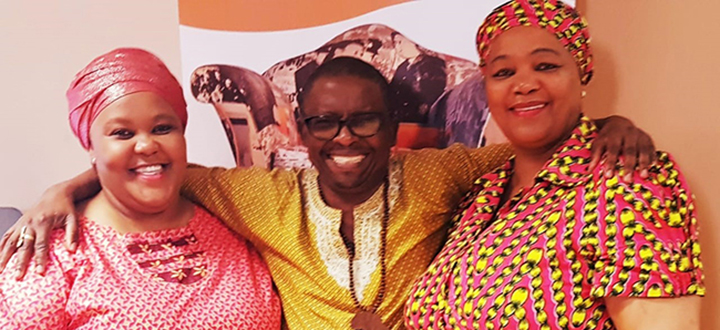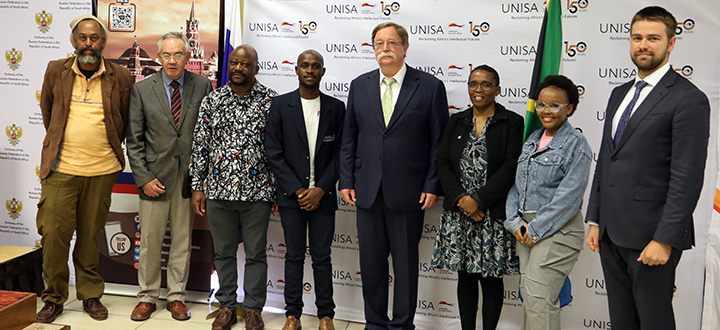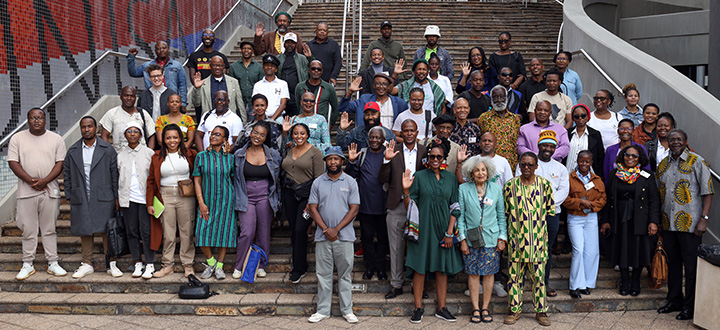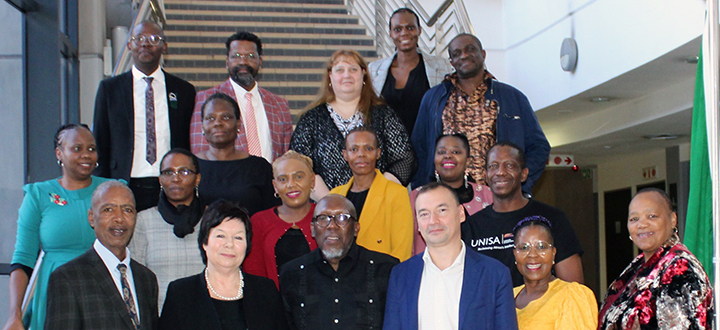News & Media
Tackling the ODL curriculum
Professors Simphiwe Sesanti and Silindile Ngubane spoke at the Transformation/Africanisation of the Curriculum in the ODL Context meeting about transforming Unisa’s curriculum to ensure a better open and distance learning (ODL) experience for students. They also shared solutions on how the curriculum can be transformed and Africanised in the ODL environment.

From left: Prof Sindile Ngubane, Head of Department: Institute of Distance Learning; Prof Simphiwe Sesanti, Associate Professor: Institute for African Renaissance; and Prof Zethu Zerish Nkosi, Manager: Tuition, Learner Support and Community Engagement, College of Human Sciences
In line with the transformation agenda of Unisa, Ngubane, who is from the Institute of Distance Learning, engaged academics on the topic of how the curriculum can be changed, specifically in an ODL context. She started by questioning how students see professors and academics. She highlighted that students see professors as unreachable and far removed from the learning process and experience. She also suggested ways in which this problem can be resolved. She posited that the gap between the student and the academic needs to be closed to transform the ODL environment. She suggested that professors must be flexible, adaptable and present in their students’ learning process, and that academics must know who they are teaching and be mindful of the challenges in the environments of those they are teaching.
Ngubane drew attention to the importance of supporting and being responsive to students since they face a myriad of social issues, stressing that some do not even have adequate access to ICT services for the modules they are doing. These challenges affect their performance and their ability to produce quality work. As an example, she related how she supported a student who was in prison by being in touch with the prison ward. She believes that, in an ODL context, academics have a duty to be responsive to their students.
Ngubane also highlighted the need for the university’s curriculum to be transformed by using technologies and by making more ICT services and technologies accessible to students in order to improve their learning experience. She mentioned that academics should possess certain qualities: they should be student centred since this will encourage students and make the learning experience easier; they should be interactive; and they should offer academic support to their students.
Sesante spoke about the Africanisation of the curriculum. He explained the process of colonisation and how the South Africa we see today needs transformation. He explained that South Africa must return to the ways of its ancestors, doing things the way they did, learning how they learnt – only then will education be transformed. He explained the damage that colonialism caused, saying that "colonialism was a distraction of the people’s soul and spirituality". He called the decolonisation that is taking place now a necessary revolution. According to him, decolonisation will not be easy, but institutions need to be Africanised, decolonised and transformed to embody and reflect Africans’ epistemologies and culture.
The transformation of the curriculum is a process that involves a change in people’s mindsets regarding how they see the ODL context and how academics treat students. Therefore, active decolonisation of the curriculum should be implemented. Academics are also required to take action that reflects a better curriculum for the ODL context.
* By Siphesihle Jojo, Marketing and Communications Assistant, College of Human Sciences
Publish date: 2019-11-29 00:00:00.0

 Unisa's student leadership engage with Russian ambassador
Unisa's student leadership engage with Russian ambassador
 Re-igniting and re-imagining Pan Africanism, Afrocentricity and Afrofuturism in the 21st century
Re-igniting and re-imagining Pan Africanism, Afrocentricity and Afrofuturism in the 21st century
 Unisa and Russian State University for the Humanities explore collaborative opportunities
Unisa and Russian State University for the Humanities explore collaborative opportunities
 Young Unisa science stars join elite Lindau Nobel Laureate group
Young Unisa science stars join elite Lindau Nobel Laureate group
 Education MEC addresses Unisa autism seminar
Education MEC addresses Unisa autism seminar